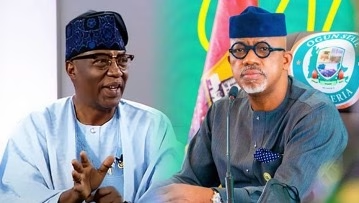One of the most talked-about political battles currently shaping Ogun State is the escalating feud between Governor Dapo Abiodun and former Governor Otunba Gbenga Daniel (OGD), who now represents Ogun East Senatorial District in the National Assembly. What began as whispered political tension has now evolved into a visible power struggle that is testing the unity of the All Progressives Congress (APC) in the state.
Though both political heavyweights initially denied any rift, recent events have laid bare the deep-seated rivalry between them. At the heart of the conflict, according to insiders, is the Ogun East Senatorial seat—currently occupied by Senator Daniel—which Governor Abiodun is reportedly eyeing as a political lifeline after completing his second term in 2027.
The first public crack in their relationship appeared in 2023, when the DATKEM Plaza, a multi-storey complex in Ijebu Ode owned by Daniel’s wife, was demolished by the Ogun State government over alleged planning infractions, despite ongoing court proceedings. Since then, Daniel’s properties—including his private residence and hospitality ventures in Sagamu and Ijebu Ode—have faced a series of contravention notices and quit orders.
While government officials cite “regulatory enforcement,” Daniel’s supporters insist that the actions are politically motivated—an attempt to erode his influence and popularity in the Ogun East zone. In return, Daniel’s camp has accused the state government of sabotaging his constituency projects, alleging that the moves are designed to diminish his relevance in the region.
Governor Abiodun, who hails from Iperu Remo—within the same senatorial district—is believed to be strategizing for the 2027 elections, determined to remain politically active beyond his tenure. Senator Daniel, on his part, sees Ogun East as his long-established political stronghold and is unwilling to yield an inch of territory to his successor.
The tension reached a new height when Daniel was suspended by his ward over alleged anti-party activities—a move his loyalists have dismissed as a calculated attempt to humiliate and silence him.
Political analysts argue that this feud transcends personal rivalry; it represents a larger struggle for control of Ogun’s political future. Abiodun, a technocrat-turned-politician, aims to consolidate his legacy and determine his successor without interference, while Daniel—armed with a vast grassroots network and the experience of a two-term governorship—seeks to protect his political base and relevance.
As both men dig in, Ogun East is fast emerging as a key battleground ahead of the 2027 elections. With Abiodun’s incumbency advantage and Daniel’s deep-rooted structures in the Remo and Ijebu blocs, the big question remains: who will step in to broker peace—or will this political war redefine the balance of power in Ogun State?

